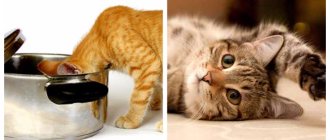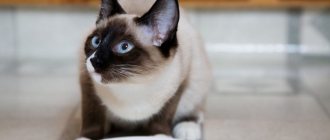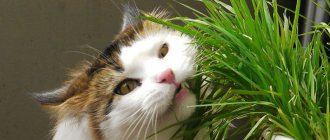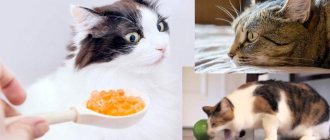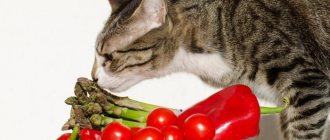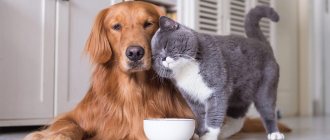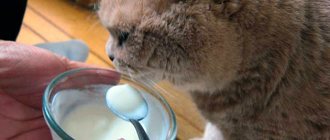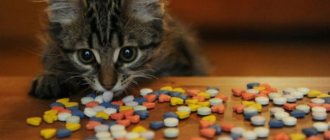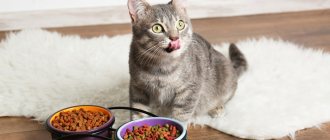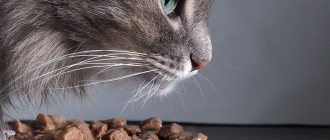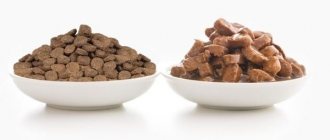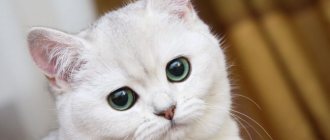If your cat is constipated, treatment should begin with a change in diet. Quite often, in the absence of serious pathologies, this measure is enough to establish bowel movements. The first step is to introduce more fiber-rich foods into your cat's diet. Coarse plant fibers perfectly stimulate the intestines and make them contract.
The basic rules of the diet for constipation depend on the diagnosis. To diagnose it and prescribe appropriate treatment, you must contact a veterinary clinic.
Constipation due to pancreatitis and changing the cat's diet
One of the causes of constipation in a cat may be inflammation of the pancreas - pancreatitis. This disease can occur in isolation, but more often it indicates other gastrointestinal pathologies. The disease is manifested by alternating constipation and diarrhea, vomiting after eating. The cat has a bloated stomach, which also hurts. With this disease, the following feeding rules must be observed:
- exclusion of fatty foods from the diet;
- It is strictly unacceptable to give an animal fried food, especially from the human table;
- milk and dairy products are excluded;
- the bulk of the diet should be meat by-products, as well as fiber-rich vegetables;
- Meat should not be given raw, it must be cooked.
Also read the article about what you should never feed cats.
The doctor also prescribes drug treatment for pancreatitis. The tablets should be given to the cat with food. It is also recommended to conduct a course of vitamin and mineral supplementation.
Disorderly feeding
It is not uncommon for a pet to receive a wide variety of food as treats every day: meat and fish, sausages, dairy products, eggs, cereals, bread and even sweets. But when asked what the animal is fed, the owner confidently answers that it is exclusively dry food, since he considers all these delicacies to be something insignificant. In fact, such disordered feeding often causes digestive disorders, which can include both diarrhea and constipation.
Intestinal blockage as a cause of constipation and proper nutrition
If the cause of constipation is a blockage in the intestines, this causes great suffering to the cat. As a rule, her stomach is swollen, there is colic, and she vomits after eating. If defecation occurs, it is in small portions and blood impurities may be found in the stool. In such cases, veterinarians recommend an enema, intestinal lavage, and drug treatment. For better fecal movement, you can give your cat a little vegetable oil (2-3 drops per meal). To solve the problem of constipation, it is necessary to make the following changes in diet:
- normalization of the ratio in the diet of BZHU;
- Be sure to include vegetables containing fiber in your diet;
- food should be well chopped, thermally processed, and have a normal temperature.
Cats with these problems definitely need to drink plenty of water.
Gymnastics
To prevent the pathological condition, walking and running, swimming, exercises to strengthen the abdominal press, squats, and bends are useful.
It is believed that mobile, active children suffer less from constipation. To prevent the pathological condition, walking and running, swimming, exercises to strengthen the abdominal press, squats, and bends are useful.
If your child is already suffering from bowel problems, it is recommended to start the day with simple morning exercises. Massage may also be helpful.
It is important to pay attention to the general change in the baby’s behavior.
The child should be taught to go to the toilet at approximately the same time and encouraged for following the daily routine (motivated and praised).
It is also important to create a favorable environment in the toilet. Nothing should distract the child from the act of defecation or frighten him in the bathroom.
Diet for obesity as a cause of constipation
If a cat has constipation, not accompanied by other symptoms (vomiting, restlessness, blood in the stool), while she is overweight and moves little, then the reason is obesity. In this case, constipation occurs very often and lasts for a long time, so the cat definitely needs help. It is recommended to do enemas, and it is also recommended to achieve weight loss through diet. Its rules:
- reducing the proportion of simple carbohydrates in the diet;
- The cat should be fed only dietary varieties of meat and poultry (chicken, rabbit, beef, lean veal);
- the meat must be frozen well, and meat by-products must be given to the animal only in boiled form, having previously been scalded with boiling water;
- vegetables should be raw, as heat treatment can increase their calorie content.
An obese cat should be fed frequently, in small portions, so that it does not feel hungry and therefore does not have the desire to overeat. You should also involve your pet in outdoor games and create conditions for him to be active.
We recommend reading the article about a proper cat diet.
Negative symptoms
With this pathology, the pet may visit its litter box frequently and to no avail.
Cats suffering from constipation typically exhibit the following symptoms:
- lethargy;
- pain when pressing on the stomach;
- loss of appetite;
- vomit;
- nausea;
- belching;
- frequent sitting in the tray;
- bloating and hardening of the tummy;
- attempts to avoid contact with people;
- temperature increase.
Supplements and Foods to Help Relieve Constipation
In addition to following a diet and taking medications prescribed by your doctor, certain food supplements can help your cat cope with constipation.
Experts recommend introducing magnesium-rich foods into your diet. This element promotes better bowel function by stimulating its contractile movements.
However, owners of neutered cats should remember that excess magnesium in the body significantly increases the risk of developing urolithiasis.
A good laxative is raw chicken liver. Also, with mechanical constipation, you can increase the proportion of fats in the diet for a short period of time. Lipids will make stool softer, making it easier to move through the digestive tract. It is not necessary to introduce fatty meats into the diet; it is better to provide her body with vegetable fats. To do this, add a few drops of olive or flaxseed oil to the food.
Many experts say that pumpkin is a good remedy for constipation. This vegetable contains coarse fibers that stimulate intestinal motility. There is no scientific evidence of the effectiveness of using pumpkin for constipation in cats, but experience shows that this method is safe and works well to cope with stool disorders.
In addition to pumpkin, you can give your cat other vegetables. Usually these animals do not like such food, especially if they are not accustomed to it from an early age. You can introduce vegetables into your diet by gradually adding them to cottage cheese, mixing them into meat dishes and porridges.
For good functioning of the intestinal tract, you can give your cat grass. In nature, they find the plants they need on their own. In an apartment, the pet is offered specially sprouted greens, which can be purchased at pet stores.
Many cats do not refuse sunflower seeds. There is no need to fry them; they should be given raw. You can mix them into food after grinding them first. The seeds contain a large amount of fats and vitamins that will help improve the digestion process.
To treat and prevent constipation, you can give your cat a decoction of flax seeds. This remedy helps both people and cats. The seed must be filled with water and boiled well, otherwise toxic substances will remain in the liquid that will harm the cat.
Bran also helps stimulate peristalsis. Once in the intestines, these products act like a brush, stimulating contractions of the intestinal walls. Wheat or oat bran is added little by little to main dishes.
Worm infestations
If you neglect anthelmintic prophylaxis (ideally, it should be carried out quarterly), the risk of worms appearing in the intestines is very high. When the number of helminths goes off scale, they prevent stool from moving forward normally, thereby causing constipation. In such a situation, it is too late to remove the worms on your own: it is wiser to contact a veterinarian, who will prescribe a step-by-step treatment regimen. The simultaneous death of a large number of parasites can cause poisoning by decay products and cause even greater harm.
The role of water in nutrition for constipation
One of the common causes of constipation in cats is dehydration. Evolutionarily, it so happens that cats have almost no feeling of thirst, but they need moisture just like all other living beings. Owners need to ensure that the cat always has access to fresh water.
It is especially important to monitor fluid intake for those who feed their pet dry food.
Cats do not like to drink very much, and if the animal refuses water, then you can pour liquid into its mouth in small portions. This must be done very carefully, making sure that the pet does not choke. For this purpose, you should use a special syringe (or a regular one, but without a needle).
Experts also recommend starting treatment for constipation by increasing the mass fraction of moisture in your pet’s diet. If a cat eats natural food, it usually does not have such problems. But lovers of dry food often suffer from constipation. In such cases, it is necessary to increase the proportion of wet canned food.
The fact is that in cats that constantly eat dry food, especially economy class food, their sugar levels rise significantly due to the excess intake of carbohydrates. The body tries to reduce it through frequent urination, which further increases dehydration.
What should the stool look like?
Cats evolved in the steppe, arid climates of Africa and the Middle East. There's little water there. The cat's body has adapted to save water: cats can limit themselves only to the liquid that they receive from their prey. Therefore, they do not sweat and do not suffer from rapid breathing in the heat, like dogs. And that's why their urine is very dense. The cat's body tries to waste as little fluid as possible. Because of this, cat feces are very hard in their natural environment. It looks more like pellets: whitish or with a yellow tint, crumbly, with an admixture of cat hairs or prey hairs.
This is what normal cat poop looks like
The fewer ingredients a cat digests, the more often it goes to the litter box. Industrial feed contains many ingredients with low nutritional value. Most of the ingredients are poorly absorbed by cats. Therefore, cats that eat dry food go to the litter box more often. Their stool is bulky, loose, and has a pungent odor.
Industrial feeds that normalize stool
For constipation, both acute and chronic, veterinarians recommend feeding your cat medicated food specifically designed to solve the problem. The most effective are the following products:
- Royal Canin FIBER RESPONSE;
- Royal Canin GastroIntestinal;
- ShinyCat Hill's;
- Eukanuba Intestinal;
- Hill's i/d;
- Hills Prescription Diet Feline w/d.
These foods contain all the substances necessary for the treatment and prevention of constipation: fatty acids, fiber, vitamins and minerals.
Having identified symptoms of constipation in a cat, the owner should immediately take measures to eliminate it. If the proposed remedies do not help, then you should show the animal to a veterinarian. It is not worth giving cats human laxatives: the dosages of the active ingredients in such medications are not designed for the weight and functioning of the animal’s body. This can only cause harm. You should examine your pet and strictly adhere to the veterinarian’s recommendations.
1111
Acute and chronic diseases
Constipation is not an independent disease, but it signals to us that something is broken in the body. Sometimes the “breakdown” is very serious. Constipation can be one of the symptoms of a tumor in the lower intestine, signaling the development of urolithiasis, spinal injury, hernia formation and other pathologies. Therefore, the absence of stool for several days is in any case a reason for a visit to the veterinarian. Believing that constipation is caused by dry food and will go away on its own after changing your diet, you risk wasting time. Remember that by solving the problem at the very beginning, you significantly increase the animal’s chances of a full recovery.
Why vegetables can be dangerous
In addition to toxins, vegetables contain traces of chemicals used in agriculture:
- Pesticides are used to protect crops from diseases, insects, and kill weeds. They cover the skin and penetrate plant tissue. When accumulated in the body, they provoke skin rashes, nausea, diarrhea, and stomach pain.
- Nitrates are formed in vegetables naturally during the breakdown of organic matter with nitrogen and come from the soil along with fertilizers. They do not cause harm, but in the body they are converted into toxic nitrites, which cause spasms and slow down blood flow. In case of severe poisoning, the structure of hemoglobin changes and it stops carrying oxygen to the tissues. In severe cases, the animal develops hypoxia, the mucous membranes of the intestines and stomach become inflamed, and protein and carbohydrate metabolism are disrupted.
An allergy to plant components cannot be ruled out. An unfamiliar vegetable species is first given only to try and the pet’s reaction is observed.
What to feed a sick cat
Unfortunately, some owners treat their pets lightly, believing that purebred cats do not get sick, and if the pet gets sick, it will recover. This approach is very dangerous! Cats need prevention of viral diseases and parasitic infestations. An animal deprived of care is guaranteed to get sick or even die, it’s a matter of time.
What happens to a cat's body during illness? In fact, the symptoms that the owner sees are only a small part of the changes to which the body has to adapt. No matter what the cat is sick with, its immunity comes into tension, that is, leukocytes constantly multiply in the blood. The only exception is immunodeficiency, in which white blood cells die.
Constant cell division and the fight against disease requires enormous resources, so proper feeding of the cat during the period of illness plays a key role. Naturally, the cat’s recovery will depend on the efficiency and competence of treatment, comfort and care that the owner can provide.
Yes, here we are talking specifically about guessing and intuitive decisions. If you have the opportunity to regularly have your pet’s blood tested, that’s great, but if you don’t have the opportunity, you will have to act according to the situation. The diet of any animal should be rich in protein, vitamins, minerals, amino acids and fats. If a cat has lost weight or is exhausted, its diet is supplemented with carbohydrates, but one must not overdo it.
The diet of a sick cat should be selected taking into account the following factors:
- At high temperatures, friendly bacteria of the intestinal microflora die, that is, dysbiosis develops. In such a situation, the cat will only benefit from quickly and easily digestible foods.
- A sick animal has irritated mucous membranes, including the oral cavity and intestines. To facilitate the process of absorption and assimilation of food, it is better to grind the treats to the consistency of a pate.
- The calorie intake should strictly depend on the cat's needs. If the animal is exhausted, the veterinarian will prescribe nutritious food, such as those produced by some manufacturers of industrial animal feeding. If the pet is overweight, a diet is prescribed to reduce the percentage of fat mass, but taking into account the maintenance of vitality.
After surgical interventions, especially if the operation was difficult and resulted in several stitches, a light diet is prescribed. The point is that the cat should drink a lot and eat only dietary foods. This way, the cat will go to the toilet, mostly in small quantities, and will not strain its muscles to empty its bowels. If the operation was performed on the abdominal cavity, a light diet is prescribed until the sutures are removed. The exception is sterilization and castration. With modern methods, the cat can be returned to its usual diet within a day after surgery.
Most veterinarians recommend switching a sick animal to special industrial feed. Many people know that there are specially medicated foods designed for animals with:
- Allergies.
- Urolithiasis.
- Sensitive digestive system.
- Ailments of the musculoskeletal system and others.
As you can see, medicinal food is intended for animals with chronic pathologies.
There are also specialized foods for cats in critical condition, although their choice is much smaller. Typically, such products contain a lot of protein (70–85%) and a powerful vitamin complex. Rehabilitation feeds are available in liquid form (in tubes) or ground into a pate. In the first case, the food is used for force feeding; the pate is intended for cats that have an appetite and try to eat on their own.
Rehabilitation food is very tasty and aromatic, which encourages even a very weak cat to eat. If you are not sure whether your pet will eat, it is better to purchase food in a tube, since a weakened pet will be more likely to lap than chew.
Is it possible to feed a cat natural food during rehabilitation? In principle, it is possible, besides, about 5 years ago there were no feeds for rehabilitation and pets were nursed on natural food. To simplify the digestion process, the diet should include boiled meat, ground to a smooth paste, cottage cheese and fermented milk products. Meat pate can be diluted with broth to be drawn into a syringe or offered to the cat to lap from a saucer.
Why does my pet refuse to eat?
When a kitten or adult is sick, the protective mechanisms of the immune system are reduced and the pet often refuses to feed. This reaction is normal for a weakened cat’s body, and owners should not worry too much or force-feed a sick cat. Usually the problem occurs in the first few days after an infection enters the animal’s body and another disease develops. After 2-3 days, the cat may ask for food on its own, or you should try to force-feed it with a small amount of food.
In most cases, the problem is associated with diseases of the gastrointestinal tract. The treatment process, during which the cat is given various drugs that reduce appetite, can affect impaired feeding. The reason may also be due to other factors:
A stressful state affects the animal's appetite.
- getting a foreign object into the throat or esophagus, which the pet cannot get rid of on its own;
- body bruise of varying severity;
- poisoning of the body;
- impact of stress.
